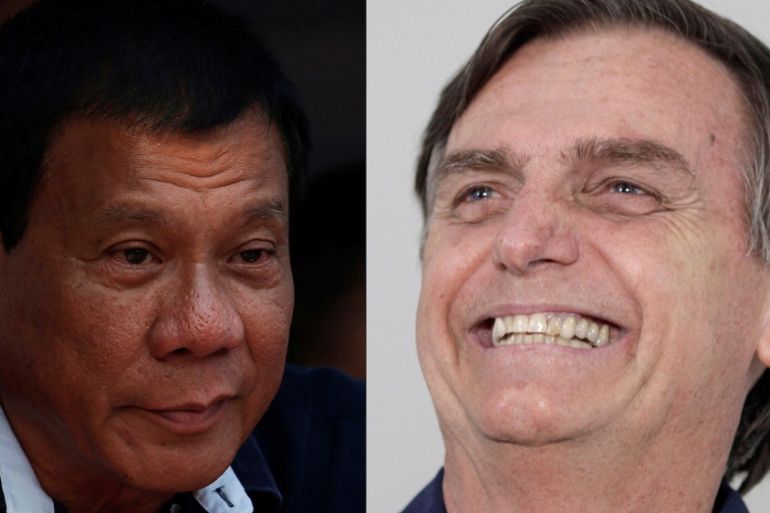Brazil gearing up for its very own Duterte
Rhetorically, the likely next leader of Brazil, Jair Bolsonaro, is almost an exact replica of the the Filipino populist.

Latin America’s biggest nation, Brazil, is on the verge of electing its first authoritarian populist in decades.
Former military officer and firebrand legislator Jair Bolsonaro, hailing from the far-right Social Liberal Party (PSL), fell just short of securing outright victory in the first round of presidential elections.
Keep reading
list of 4 items‘Absolute power’: After pro-China Maldives leader’s big win, what’s next?
Solomon Islands pro-China PM Manasseh Sogavare fails to secure majority
Pro-China party on course for landslide victory in Maldives election
But he is widely expected to win tomorrow’s runoff contest against former Sao Paulo Mayor Fernando Haddad of the Workers’ Party (PT), who is largely seen as the candidate of a discredited status quo.
Brash, polarising and brazen, the charismatic Bolsonaro is often compared to American president Donald Trump, who cruised past establishment candidates by launching an unorthodox campaign that defied all political conventions.
Upon closer look, however, Bolsonaro is less of a “tropical Trump” than a Latin American version of Rodrigo Duterte, the authoritarian Filipino president, who has upended one of Asia’s oldest democracies through a violent drug war that has claimed the lives of thousands of suspected drug dealers.
Both men have advocated violence as a cathartic solution to their respective countries’ democratic ills. Similar to Duterte’s case in the Philippines, a Bolsonaro presidency will likely usher a new dark era, where unhinged authoritarianism and widespread violence reign at the expense of democratic institutions.
Varieties of populism
In the West, populists such “Brexiters” and Trump seized political momentum by tapping into the ideational as well as economic grievances of an increasingly marginalised white, rural population.
As historian Niall Ferguson points out, the two key factors that have been driving populism in the developed world are immigration, especially from distant nations with different racial and cultural makeup, as well as economic stagnation, particularly in post-industrial rustbelts hit by decades of manufacturing outsourcing.
In short, the main constituencies of Western populists are the losers of globalisation. In the emerging economies, however, authoritarian populism is mainly driven by middle-class disenchantment in spite of years of rapid economic growth.
Both the Philippines and Brazil have been the winners of globalisation in the 21st century, scoring above-average highest growth rates in recent memory. Immigration has been largely a non-issue among their diverse and cosmopolitan populations.
Rising from the dark fringes of Brazilian politics, Bolsonaro’s electoral shock, similar to Duterte’s in 2016, is a classic case of “protest vote” by the disillusioned middle classes.
Middle-class revolt
As early as 2013, emerging market democracies such as the Philippines, India, Turkey and Brazil experienced large-scale protests led by middle-class citizens amid massive corruption exposes. At the heart of their demands was an end to corruption as well as better quality of public services.
As political scientist Francis Fukuyama observed back then, the higher frequency of protests reflected a fundamental shift in the politics of newly prosperous democracies, whereby the “technologically empowered middle class will be highly demanding of their politicians across the board” after of rapid economic growth.
In the case of Brazil, the Mensalao corruption scandal, which led to the prosecution of countless officials, undermined public trust in the entire political establishment.
Top leaders, across the political spectrum, were accused of accepting bribes in exchange for lucrative government contracts.
The upshot was not only a collapse in public support, especially among middle classes, for the left-leaning Workers’ Party but also generalised mistrust towards conventional democratic politics.
The attendant climate of ‘grievance politics’ provided a perfect opening for millenarian candidates such as Bolsonaro. Just like Duterte in the Philippines, the Brazilian leader captured public imagination by promising a complete overhaul of the country’s politics, even if this meant a return to the dark days of authoritarian rule.
Specter of neo-fascism
Rhetorically, Brazil’s incoming president is almost an exact replica of the Filipino populist.
Both men have advocated “shoot-to-kill” orders against suspected criminals, indulged in outright misogynistic statements, glorified their countries’ past dictators throughout the 1970s and early-1980s, and portrayed their political rivals as enemies of the state.
Both Brazil and the Philippines are fledgeling democracies with weak institutional checks on executive excesses. This is why Duterte has faced limited resistance to his imperial presidency, which has seen the gradual purging of independents and democratic opposition from state institutions.
Bolsonaro will likely also enjoy a similar level of democratic impunity once in power. Just like his Filipino counterpart, Bolsonaro is expected to fill his cabinet with countless military men, promising to bring about stability under firm “iron-fisted” leadership.
The obvious risk is the politicisation of the armed forces at the expense of democratic control over men in barracks, who previously ruled the country for more than two decades (1964-1985).
Combined with Bolsonaro’s authoritarian tendency and violent anti-crime policies, the militarization of Brazilian politics could spell disaster for the country’s democratic institutions. It will likely lead to greater state reliance on brute force to silence the opposition, dominate public discourse, and solve complex social problems such as drugs and criminality.
For now, markets and the elites have enthusiastically welcomed Bolsonaro’s ascendance as a much-needed corrective to years of corrupt and feckless rule under mainstream politicians. But Brazil, once the beacon of hope in Latin America, has now entered the twilight zone.
The views expressed in this article are the author’s own and do not necessarily reflect Al Jazeera’s editorial stance.
